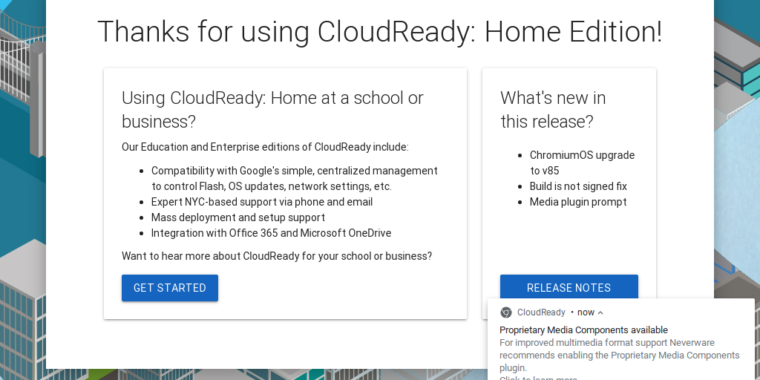

Jim Salter
This week, Google acquired OS vendor Neverware, makers of ChromiumOS’s CloudReady distribution. ChromiumOS is the fully open source, upstream version of ChromeOS, the heavily limited, cloud-centric operating system on which Chromebooks and Chromeboxes run.
The acquisition sounds great on paper – Google certainly has more resources than Neverware, including but not limited to the developer base for ChromeOS itself. According to Neverware’s FAQ on the transition, Big G will honor all existing licensing agreements and currently has no plans to limit the availability of CloudReady’s free Home edition.
All of this good news unfortunately comes with “ right now ” caveats on every bullet point – which seems a bit nerve-wracking to us, given that it comes as it does immediately after Red Hat announced it would kill CentOS Linux and replace it with CentOS Stream.
While there is no actual connection between Google and Red Hat, the relationship between CloudReady and Google’s own ChromeOS was more or less an exact replica of the one between RHEL and CentOS. The flagship distribution is open source in both cases and the source code is available – but compiling into a working product is an important undertaking, and that final working product is not freely available from the vendor.
CloudReady, like CentOS before it, takes the freely available resource from the parent distribution and turns it into a freely available and immediately functional clone.
A Chromebook with a different name
The analogy between CentOS and CloudReady falls a bit apart when the issue of hardware comes into play. RHEL and CentOS are both installed on the same generic x86 hardware, but Google ChromeOS is only distributed on Google-approved Chromebooks and Chromeboxes, with a very limited lifecycle and support windows.
CloudReady aims to spread the ChromeOS experience beyond those hardware boundaries and short life cycles – it can be installed on any PC hardware and it does not ‘expire’ automatically when that hardware reaches a certain age. For schools with an aging fleet of Windows 7 PCs that wouldn’t do well with Windows 10, CloudReady provides a way to modernize the operating system without having to refresh the hardware itself.
While the primary revenue stream for Neverware comes from educational and business customers who pay per-device licensing fees, the company also offers a free Home version. With the Home edition of CloudReady, anyone can turn an old PC (or a new, very cheap PC) into a Chromebook-like system.
The free Home version cannot be managed with the Google Admin console, as Chromebooks would be in education or corporate environments, but is otherwise a functional ChromeOS alternative, including regular automatic security upgrades. Education and Enterprise CloudReady variants take it one step further and are fully manageable with Chrome Management and Google Admin Console.